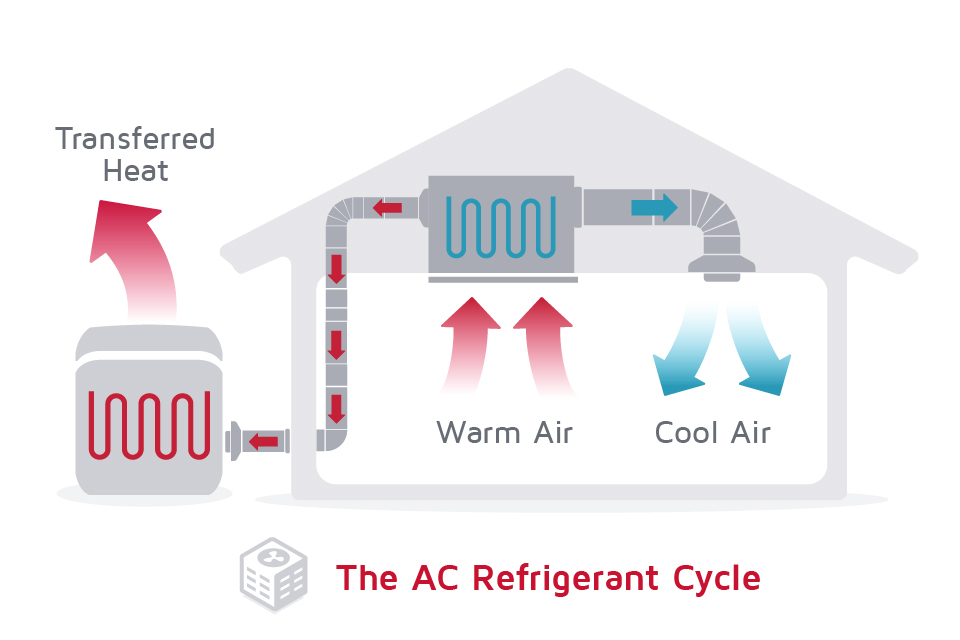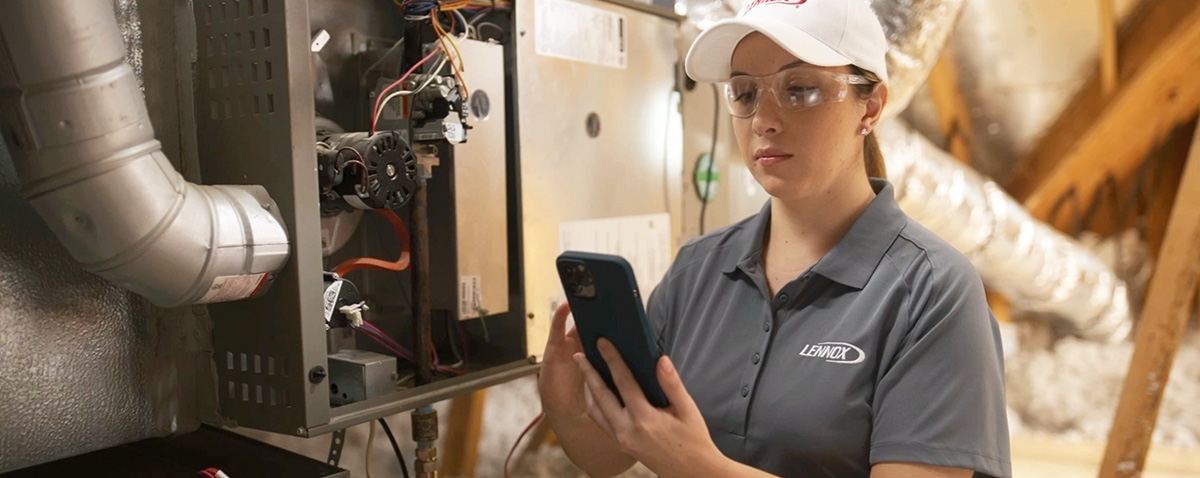Common Causes and Solutions for Air Conditioner Water Leaks
Air conditioner water leakage is a common occurrence, especially during the warmer summer months when your system is working its hardest. While a certain amount of water from condensation can be normal, excessive build up or leakage can indicate possible issues with your system.
Understanding Water Leakage
When discussing water build up or leakage, it’s important to understand where the water comes from. We all understand that an air conditioner cools your home, right? Actually, your air conditioner doesn’t cool the air directly. It reduces the temperature inside by removing heat and transferring it outside.
Though that might seem complicated on the surface, the process is actually quite simple.

As this process takes place, the warm air constantly blowing over the evaporator coil where the heat is being extracted causes moisture to build up on the coil. As this moisture builds up, it drips into the drain pan where a drain line carries it outside.
This process is a normal part of every system’s cooling cycle.
It only becomes an issue if that water begins to accumulate or overflows the drain pan. If that happens there is likely something more going on.
Knowing When a Water Leak is Serious
While water leakage can begin as a mild inconvenience, it can easily escalate, causing serious damage to your home – destroying ceilings, walls and floors. It’s important to know the signs and understand how much is too much. Here are a few common signs there could be a serious issue.
Excessive Build-Up
Water consistently pooling in the drain pan or leaking or accumulating on the floors around the pan can indicate a problem.
Mold or Mildew
Excessive moisture over time can promote the growth of mold and mildew around your unit.
Persistent Humidity or Cooling Issues
If your system is circulating unusually humid air or has trouble cooling your home, it could indicate an excessive moisture issue. If you notice this, the next step would be to inspect your drain pan and the area around it for signs of a current leak or past water build-up.
If you notice any of these signs, we recommend contacting an HVAC professional to inspect and repair your system as soon as possible. Putting this off can only lead to further damage and more costly repairs.
Common Causes for AC System Water Leaks
As we mentioned, excess water build-up can not only cause damage to your home, but if left unaddressed, it can lead to bigger, more costly issues with your air conditioner. Water build-up can indicate any number of issues and it’s important to get your system inspected if you notice a leak.
If you notice a leak or water accumulation, it may be due to one of the following:

Clogged or Damaged Drain Tube or Pan
The tube running from your drain pan could be disconnected or clogged by dust or other material. Your drain pan may also be damaged or old, causing drips in the wrong places. This is a common cause for air conditioner leaks. Keeping these drainage components in good repair is one of the easiest ways to avoid leakage issues.
Dirty Air Filters
Keeping your air filters clean and up to date is also a simple way to avoid moisture build-up. Dirty filters can cause your air conditioner to have to work longer and harder to do its job, resulting in excessive condensation on the evaporator coils.
Frozen or Dirty Evaporator Coil
Keeping your evaporator coil from freezing is a balancing act between the refrigerant inside and the warm air flowing over it. When that air flow is reduced, ice can form on the coil and the buildup may overstress the system causing an increase in energy usage. That ice can also gradually melt, flooding your drain pan and leading to a leak.
Dirty or dust-clogged air filters are the most common cause of a frozen coil. Clogged filters can reduce the amount of warm air flowing over your coil allowing frost to form.
A build-up of dust or grime on your evaporator coil can also cause ice accumulation on your coil, leading to a leak.
Low refrigerant can also lead to a frozen evaporator coil. If you notice a frozen coil, or your air conditioner is struggling to cool your home, it’s possible you have a coolant leak somewhere within your system. Caught early enough, a refrigerant leak can be repaired, but left unchecked could cause serious damage to your air conditioner. If you suspect a leak, you should call a technician as soon as possible to address the issue.
Damaged Condenser
The condenser lives in your outdoor air conditioner or heap pump. It is the part of the cooling cycle that releases the heat collected in the evaporator coil to the outdoors.
A damaged condenser, or aging gaskets or sealant can hamper the heat exchange process within your system and lead to a water leak.
Condenser damage can include or lead to coolant leaks, compounding the problem. If you suspect a condenser issue, it’s important to contact a technician who can determine the best course of action.
Improper Installation
If you’ve had your air conditioner or major components of your system installed recently, we advise calling your contractor and let them know the situation. Your leak may stem from an issue related to the installation that they can fix as a follow up to the original install at no additional cost to you.
With the exception of filter replacement and general drain pan maintenance, all of the causes above are issues that should be addressed by a qualified professional. Find a Lennox dealer in your area and schedule an inspection to determine the cause of your water leak and prevent future issues.
Preventing and Addressing Water Leakage Issues
The best way to prevent water leaks and other issues that can stem from them is with proper system maintenance.
It’s important to keep up with air conditioner maintenance. Tasks like filter replacement, keeping your air conditioner’s drain pan clean, and inspecting your system regularly for dust, obstructions, or signs that additional maintenance is required can go a long way toward preventing larger maintenance issues. Click here to learn more about air conditioner maintenance.
Beyond that, regular inspections and yearly tune-ups – typically just before summer, will help reduce the risk equipment issues including water leaks and the damage they can cause while improve your air conditioner’s performance and efficiency.
It’s also good to be realistic about your indoor comfort during extreme weather, setting thermostats at reasonable levels that provide you the with comfortable environment you want without overworking your system.
Call a Professional
If you’ve noticed any of the signs we’ve discussed in the article, you may be headed toward a problem or breakdown that could leave you without your air conditioner for a time and possible costly repairs.
Many of the issues related to water leaks require the skilled eyes of a trained technician to properly diagnose and repair. Attempting to fix a problem yourself can lead to injury and further damage to your equipment – resulting in more costly repairs in the end.
If you don’t have one already, seek out and build a relationship with a reliable contractor in your area to ensure the best performance out of your air conditioner, prevent future issues, and keep your family on the road to perfect air.

